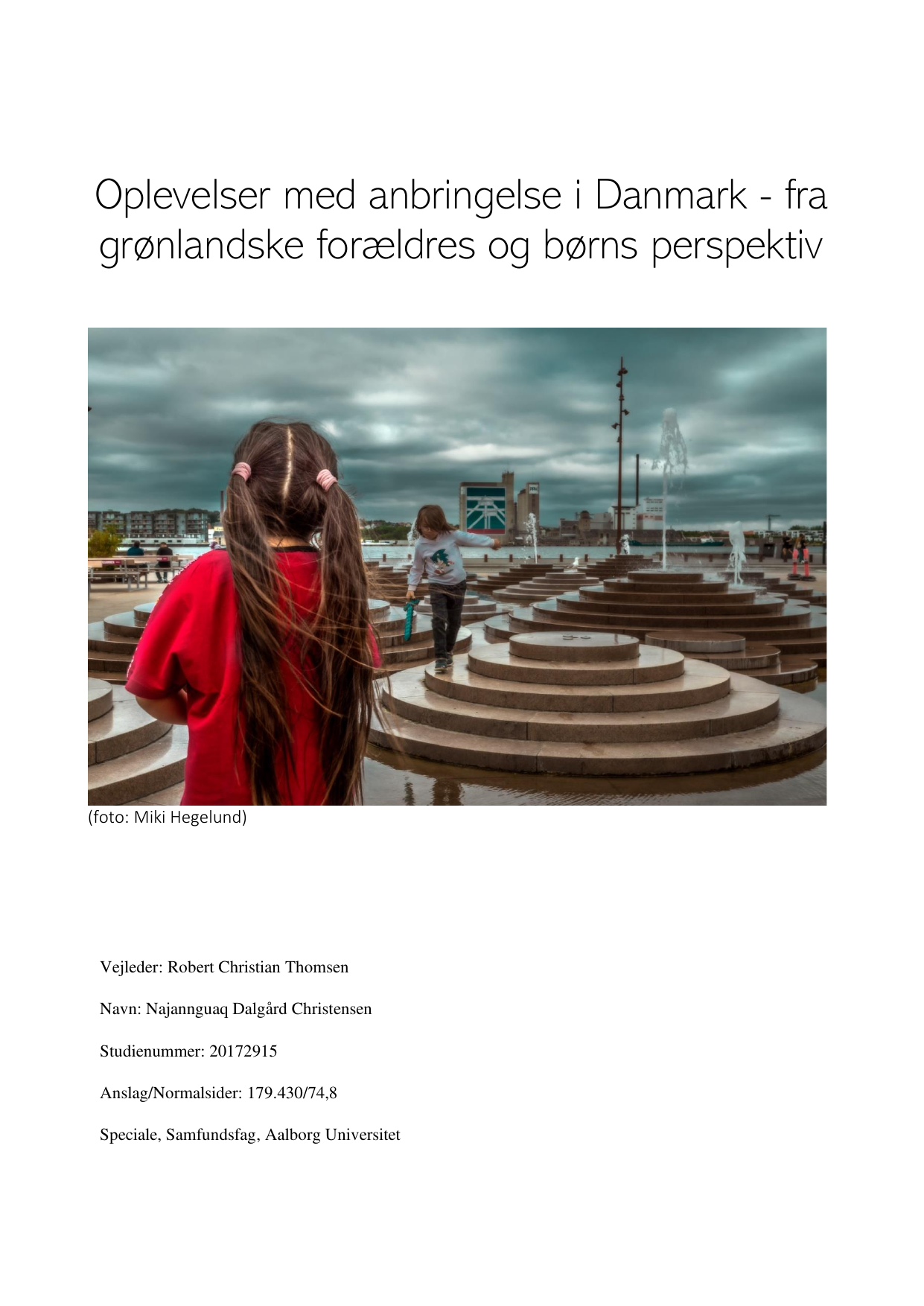
Oplevelser med anbringelser i Danmark - fra grønlandske forældres og børns perspektiv: grønlandske anbringelser i Danmark
Oversat titel
Experiences with out-of-homecare in Denmark - from the perspective of Greenlandic Parents and Children: Greenlandic out-of-homecare in Denmark
Forfatter
Semester
4. semester
Uddannelse
Udgivelsesår
2022
Afleveret
2022-09-30
Antal sider
74
Abstract
Grønlandske børn anbringes der anbringes uden for hjemmet i Danmark er syv gange højere end etnisk danske børn. Hvordan oplever forældre og børn en anbringelse, og hvilket perspektiver har de på anbringelsen. oplever forældre og børn at blive inddraget tilstrækkeligt i sagsbehandlingsprocesserne, og hvordan kommer det til udtryk. At komme fra en anden kultur, betyder ofte at der skal tages ekstra hensyn til børnene og hvor man anbringer dem, men spørgsmålet er, om det sig gældende for de grønlandske anbragte børn. Hvordan er det for børnene at være anbragt uden for hjemmet, og hvad gør det ved deres kulturelle baggrund og deres identitet. Oplever forældrene, at blive stereotypiseret med andethed pba. deres grønlandske baggrund, og hvordan spiller kulturforskellene mellem Danmark og Grønland en rolle ifm. at grønlandske børn anbringes uden for hjemmet.
Greenlandic parents living in Denmark experience that their children more often are taken into foster care. Figures show that this happens 7 times more often than Danish families. This thesis will describe and seek to understand the Greenlandic parents and children's experiences with out-of-homecare in Denmark. The methodology chosen, is the semi struc-tured interview of both parents and children that are or have experiences with out-of-home-care - both former children taken into foster care and children that are currently in foster care. The starting point of this thesis are the interviews and the information given by both parents and children will be analyzed with several theories, including cultural theory, theories about stereotypes, post-colonial theory and so on. Six different theories will be used to an-alyze the Greenlandic parents and children’s experience with out-of-homecare, and their perspectives about being included in the administrative processes regarding their own case. This is to get a more nuanced perspective of how Greenlandic parents and children have or are experiencing the Danish foster care system. Especially the Greenlandic parents are left with confusion due to the lack of interpretation during the meetings, the feeling of not being heard, the feeling of not being understood, the feeling that the caseworkers define them as individuals and define their challenges. That often entails that most of the parents describe the cooperation with the caseworkers as non-existing. The vast majority of the Greenlandic children taken into foster care describe the feeling of not being heard or included in their own case. Most of the children are sad about losing their Greenlandic culture and language during their stay at their foster care parents or institutions. One child describes that his Greenlandic identity was stolen from him. The indigenous population - the Greenlanders in Denmark - seem to be unworthy to speak, to be trusted, to be seen as civilized citizens etc. due to the cultural differences in language, the way of living, the way of planning etc. At that point the Greenlandic family’s behavior, choices etc. seems to be misinterpreted. This could be explained by the caseworkers’ prej-udice towards the Greenlandic culture and way of living or due to the lack of cultural knowledge about Greenland and Greenlandic culture, and this indicates why the Green-landic parents during the case processes have a feeling of not being heard or feel that they’re not included in the processes. The overall conclusion is that the subalterns are not able to speak cf. Spivak and entails several other challenges for the Greenlandic parents and children in question, and that the Greenlandic parents are not able to foster their children and can be the explanation of why Greenlandic children more frequently are taken into foster care than the Danish children.
Emneord
